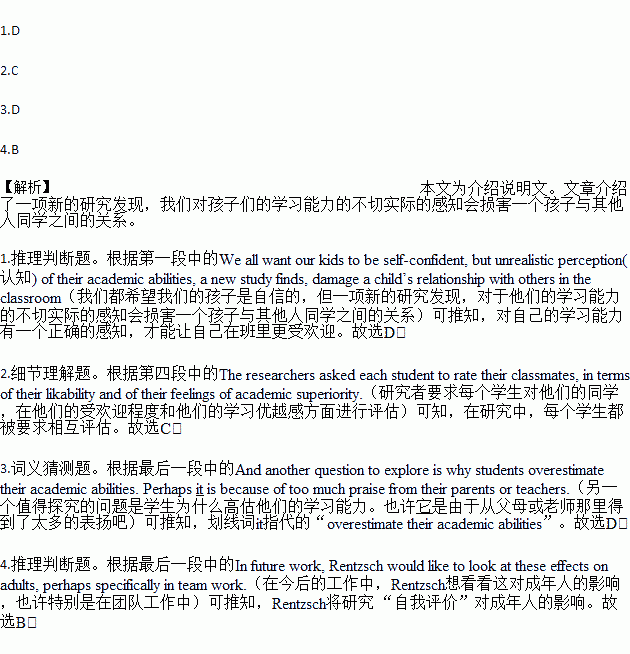题目内容
“I’m the smartest kid in class.” We all want our kids to be self-confident, but unrealistic perception(认知) of their academic abilities, a new study finds, damage a child’s relationship with others in the classroom: The more one student feels unrealistically superior(更好的) to another, the less the two students like each other.
Katrin Rentzsch of Bamberg University in Germany first became interested in the effects of such self-perception when she was studying how people became labeled as nerds(书呆子). “I really got interested in the question of whether it’s OK to boast(吹嘘) about achievements,” she says.
This line of thinking led her towards something psychologists call “self-enhancement” -when a person feels unrealistically superior to someone else. So Rentzsch and her colleague Michela Schroder-Abe decided to take a closer look at how such self-enhancement affects relationships, so they turned to the eighth-grade classroom, somewhere they could measure differences between actual academic performance, and social popularity. The 358 students came from 20 eighth-grade classes in schools in southeast Germany.
The researchers asked each student to rate their classmates, in terms of their likability and of their feelings of academic superiority. They then compared those ratings with the students’ grades in math, physics, German and English. Importantly, they conducted the analysis at two different social levels: “habitual”-the way people act in general, and “relationship”-the way someone acts around a specific individual.
In future work, Rentzsch would like to look at these effects on adults, perhaps specifically in team work. She’s also interested in self-enhancement beyond academic achievements, for example physical attractiveness. And another question to explore is why students overestimate their academic abilities. Perhaps it is because of too much praise from their parents or teachers.
1.According to paragraph 1, what should a student do to be more popular in class?
A. Try to love other students.
B. Share with others his achievements.
C. Think highly of others’ academic abilities.
D. Have a correct view of his academic abilities.
2.What was each student required to do during the study?
A. Analyze their relationships with others.
B. Compare themselves with the others.
C. Make assessments about each other.
D. Share their academic performance.
3.The underlined word “it” in the last paragraph refers to .
A. students’ academic abilities.
B. students’ desire to be praised.
C. students’ difficulty in exploration.
D. students’ overestimation of their academic abilities.
4.What would Rentzsch study in the future?
A. The effect of self-enhancement on students.
B. The influence of self-enhancement on adults.
C. The cause of people’s physical attractiveness.
D. The ways of making academic achievements.

